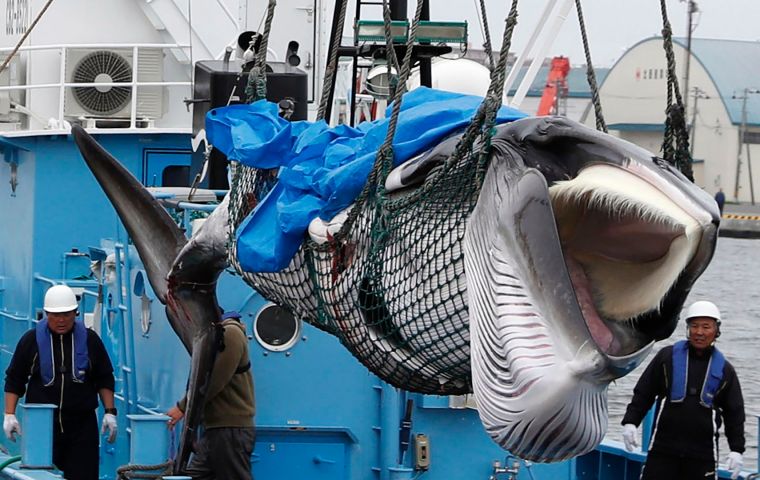MercoPress. South Atlantic News Agency
Japanese whaling industry on the brink of collapse: less demand, less subsidies for whale meat
 Japanese whalers drew international criticism for exploiting a loophole in the IWC's regulations that permitted “scientific whaling”
Japanese whalers drew international criticism for exploiting a loophole in the IWC's regulations that permitted “scientific whaling” The whaling industry in Japan is on the brink of collapse as young generations tastes have rapidly changed and government subsidies are beginning to shrink. The industry employed thousands of people in the decades immediately after World War II, and sustained entire communities during those difficult economic times, is today losing the government subsidies that has kept it afloat.
The whaling industry insists that it is pushing ahead with plans to modernize operations, cut costs and encourage more people to consume whale meat, but environmental campaigners says they are just delaying the inevitable.
Three years ago, Japan had become frustrated by its inability to convince other members of the IWC that there are sufficient whales in the world's oceans to justify a return to commercial whaling.
At the same time, Japanese whalers drew international criticism for exploiting a loophole in the IWC's regulations that permitted “scientific whaling.” Japan harpooned hundreds of whales across the Pacific every year on the pretext of studying their migration routes and to obtain data on whale numbers, their health and breeding patterns.
In order that the “byproduct” of this lethal research did not go to waste, the fisheries ministry was keen to emphasize that whale meat was then sold.
While the industry was delighted that the government was once more permitting them to carry out commercial whaling, there was concern that state subsidies would be phased out and that whaling firms would have to operate like any other private sector firm. If they failed to make a profit, then they would go under.
Japan's whaling fleet is operated by Kyodo Senpaku Co, the sole offshore whaling company in Japan. It has an annual quota of 52 minke whales, 150 Bryde's and 25 sei whales within the nation's exclusive economic zone.
Kyodo Senpaku employs 170 people. It operates four ships, consisting of three hunting vessels, and the world's only whaling factory ship, Nisshin Maru, which processes the carcasses.
According to the Fisheries Agency, the government provided subsidies of approximately 5.1 billion yen (€36.5 million) for “scientific whaling” each year to keep the industry afloat.
However, that was cut to 1.3 billion Yen after Japan left the International Whaling Commission, IWC, and last year it slashed subsidies to a loan of 340 million yen that needs to be repaid.
Without subsidies, the break-even price for 1 kilogram of whale meat is 1,200 yen (€8.58). However the 2,000 tons that was caught in 2020 was sold at an average of just 1,100 yen
A key part of the industry's modernization plan is the construction of a new mother ship, with work scheduled to start next year and completed in March 2024.
The price tag 6 billion yen should be offset if the government permits an expanded quota of whales and the Japanese public can be convinced to eat more whale meat, said Konomu Kubo, a spokesman for Kyodo Senpaku, said.
“In addition to its excellent nutritional value, whale meat has health functions. such as an anti-fatigue effect and helping to prevent dementia, according to the results of scientific studies”
“Also, in terms of taste and depending on the way it is cooked, I think whale meat is nice food that is by no means inferior to beef or tuna. We believe that implementing various promotional activities will increase the value of whale meat and lead to increased sales,” he added.
Patrick Ramage, senior director of the International Fund for Animal Welfare, dismisses the whaler's claim. “What we are witnessing is a dying industry sinking of its own weight”.
“Japan's withdrawal from high seas whaling was a death blow, an acknowledgement that even massive government subsidies could not keep it afloat. Thirty-six months later, even the most ardent advocates for commercial whaling see it as a charity case, completely reliant on taxpayers' support,” he said.
“Consumer demand continues to plummet while costs continue to soar,” he added.
“Even the Japan Fisheries Agency has now abandoned any pretense that commercial whaling can be profitable. Over the past 60 years, whale meat consumption in Japan has dropped by 99%. Spending billions of yen to build a new boat will not revive an industry that is dead in the water,” Ramage said.




Top Comments
Disclaimer & comment rulesCommenting for this story is now closed.
If you have a Facebook account, become a fan and comment on our Facebook Page!